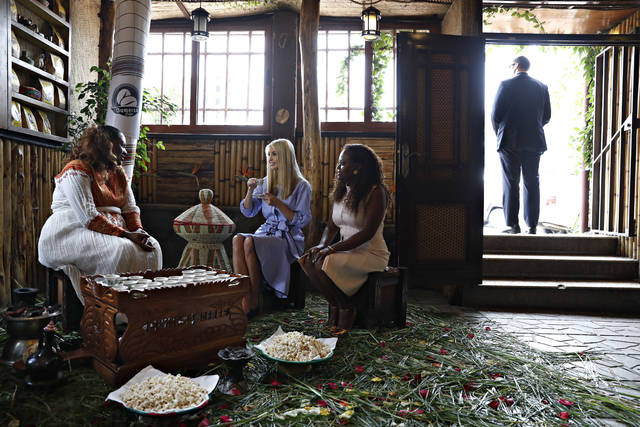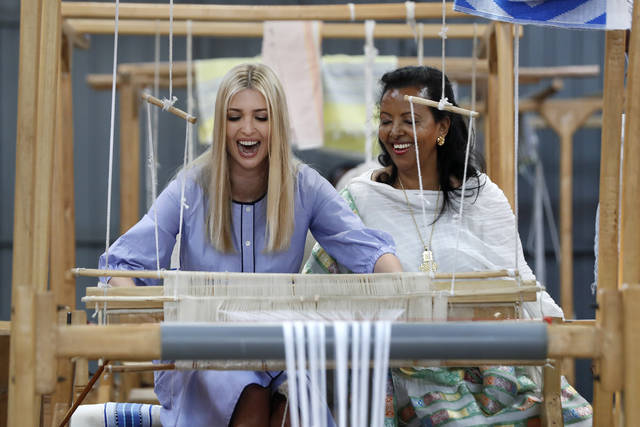Ivanka Trump promotes women’s empowerment in Ethiopia

White House senior adviser Ivanka Trump sips coffee during a coffee ceremony at Dumerso Coffee, Sunday April 14, 2019, in Addis Ababa, Ethiopia. Trump is visiting Ethiopia and then Ivory Coast to promote a global economical program for women. (AP Photo/Jacquelyn Martin)

White House senior adviser Ivanka Trump, center, attends a coffee ceremony at Dumerso Coffee, Sunday April 14, 2019, in Addis Ababa, Ethiopia, with Kidist Birhanu, left, and Eleni Melesse, with USAID, right. (AP Photo/Jacquelyn Martin)

ADDIS ABABA, Ethiopia Far from the din of Washington, Ivanka Trump toured businesses run by women in Ethiopia on Sunday while promoting a White House global economic program for women.
ADDIS ABABA, Ethiopia — Far from the din of Washington, Ivanka Trump toured businesses run by women in Ethiopia on Sunday while promoting a White House global economic program for women.
President Donald Trump’s daughter and senior adviser visited a coffee shop and textile company in Addis Ababa. It was her first stop in Africa on a four-day trip to Ethiopia and Ivory Coast on behalf of a White House project intended to boost 50 million women in developing countries by 2025.
Aiming to offer assistance and learn about the struggles of women in business, she took part in a traditional coffee ceremony, visited with weavers and announced new financial support for businesses.
“Investing in women is smart development policy and it’s smart business,” Trump said, sitting in Dumerso Coffee, a dimly lighted space with a woven ceiling, tile floor and colorful paintings. Alongside were women who work in the industry. “It’s also in our security interest, because women, when we’re empowered, foster peace and stability,” she said.
This is Ivanka Trump’s first visit to Africa since the president launched the Women’s Global Development and Prosperity Initiative. It’s a program she hopes will outlast an administration better known for “America First” isolationism.
She has drawn praise for taking on this project and for making the trip. But thousands of miles from Washington, she is sure to be shadowed by her father’s efforts to cut international aid, as well as his past disparaging comments about Africa.
Ivanka Trump arrived in Ethiopia early Sunday, flying commercial.
She first visited the coffee shop and then went to the textile and craft manufacturer Muya, where she was greeted by dancers and chatted with women seated at colorful looms. She took a seat at one herself. She also noted that she was in the country with Africa’s second-highest population.
“Ethiopia’s success is Africa’s success,” she said. “We learned today that the quality of the coffee is second to none. You shared with me that Ethiopian cotton rivals cotton anywhere in the world. And then of course the skills and the craftsmanship of the Ethiopian people. We hope more people realize their full potential.”
Ivanka Trump was accompanied by Mark Green, administrator of the U.S. Agency for International Development, and David Bohigian, the acting president of the Overseas Private Investment Corp., which provides loans, loan guarantees and political risk insurance, funding projects that stretch across continents and industries. OPIC, working with Ivanka Trump, last year announced a project geared at women.
At the coffee shop they announced a loan, issued by a local women-focused bank and backed by USAID, for a coffee business owned by women. At Muya, they announced additional OPIC financing.
Later in the trip, she plans to meet with Ethiopian President Sahle-Work Zewde and Prime Minister Abiy Ahmed. In Ivory Coast, she will visit a cocoa farm and participate in a meeting on economic opportunities for women in West Africa. That gathering is part of the World Bank’s Women Entrepreneurs Finance Initiative, a program that Ivanka Trump pushed the bank to introduce.
She will be joined in Ivory Coast by a U.S. congressional delegation that will include U.S. Sen. Lindsey Graham, a close ally of the White House.
Reaction to the visit reflected the contradictions of Ivanka Trump’s role.
Activist Marakie Tesfaye, who founded a group in Ethiopia for women, welcomed the attention. “I think she’s coming genuinely to empower women and it’s good that she’s coming because she will push forward our agenda,” she said.
Ethiopian journalist Sisay Woubshet was more skeptical, citing Donald Trump’s past comments. “I don’t think people will have a good feeling about his daughter’s visit this time around to promote her global initiative towards women.”
For Ivanka Trump, those challenges come with the territory.
She has spent two years promoting a family-friendly agenda in an administration focused on hard-line immigration tactics and protectionist trade policies.
To questions about international aid spending, she has said the administration strives to be generous in a “fiscally responsible way,” and has argued that investing in her project, which builds on previous White House efforts, is a way to promote security in developing countries.
The new global women’s initiative involves the U.S. State Department, the U.S. National Security Council and other American agencies. It aims to assist women in developing countries with job training, financial support and legal or regulatory reforms.
Money for the effort will come through USAID, which initially set up a $50 million fund using dollars already budgeted. The president’s 2020 budget proposal requests an additional $100 million for the initiative, which will also be supported by programs across the government as well as private investment.
Experts praised the government-wide approach, which will incorporate new and existing programs, though some stressed that it was early in the process. The investment comes as the president is proposing cuts to foreign aid, and as the administration is expanding a ban on U.S. aid to groups that promote or provide abortions.
“The part of the proposal which is around looking at laws — that is a good thing to focus on,” said Charles Kenny, a senior fellow at the Center for Global Development, referencing the initiative’s support for changing laws, regulations and customs that create barriers preventing women from fully participating in the workforce.
But he said the abortion-related ban could have a negative economic impact. “I think one of the most powerful tools for women’s economic empowerment is the ability to choose when and how many children they have,” Kenny said.
Daniel Runde of the Center for Strategic and International Studies said Ivanka Trump was strategically building on the work of past administrations. He called her an effective “goodwill ambassador” for the issues and a smart emissary to send to Africa.
Hillary Clinton, as U.S. secretary of state, “provided high-level attention to these issues,” said Runde, who previously worked for USAID and is an informal adviser to the administration on development policy. “Ivanka Trump is playing a similar role to the role that Secretary Clinton played.”
———
Associated Press writers Elias Meseret in Addis Ababa, and Alexis Adele in Abidjan, Ivory Coast, contributed to this report.

